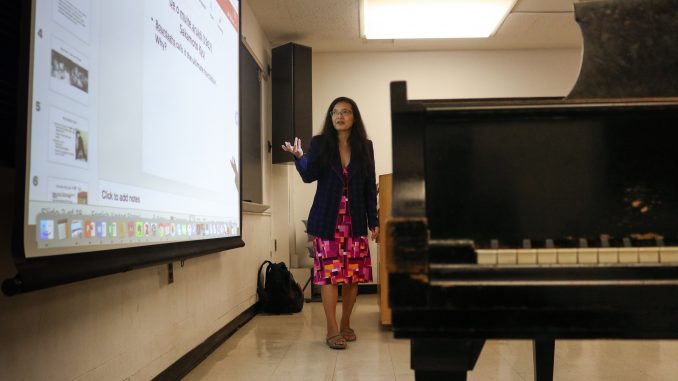
After several years of working in finance on Wall Street, Noriko Manabe decided to drastically change careers.
In 2003, she began to pursue a Ph.D. in Ethnomusicology and Music Theory — the study of music in relation to cultures — at CUNY Graduate Center.
Manabe, in her second semester at Temple as an associate professor of music studies, developed a course about popular music in Japan.
The honors special topics course, Japanese Popular Music, explores Japanese music from 1880 to the present day.
Manabe said in order to teach students about Japanese popular music, she first gives them an idea of what traditional Japanese music sounds like.
“We talk about ‘shakuhachi’ flute, certain kinds of traditional song and then we talk about Japanese type of drumming as examples of traditional music,” she said. “Then we start talking about how music in Japan became westernized and a lot of the westernization process actually happened in the school system.”
Manabe said Japanese schools typically taught western-style music in the 1910s when music classes became mandatory.
Manabe’s class also explores shifts after World War II and other musical genres in Japan like rap, rock, jazz, folk, reggae and techno. Manabe teaches brief lessons on how Japanese music is used in anime and technology, and the overseas reception of Japanese popular music.
Manabe, a Japanese-American musician, spent most of her career working in the investment industry. She worked as an analyst covering technology and media industries.
Manabe began researching Japanese music, its intersections with politics and social issues and more. She taught a similar course about Japanese popular music at Princeton University before coming to Temple.
Matthew Jenkins, a junior film and media arts major in Manabe’s class, said he enjoys learning about the history of Japanese music. He said Manabe also tells her students about related events outside of class, like a ‘taiko’ drumming concert at Rock Hall and a screening of a new documentary about Japanese social movements, “Tell the Prime Minister,” hosted by the Asian and Middle Eastern languages department.
“It’s a subject I didn’t know much about before the class, so I’ve really learned a lot,” he said. “Thanks to the class, a lot of opportunities to learn more about Japanese music and culture have presented itself.”
Cynthia Folio, chair of the music studies department, said the class is a good addition to the music studies curriculum.
“It underscores the important connections between social events and popular music in Japan,” she said. “Students will develop an appreciation for Japanese music and aesthetics, and understand the effects of westernization on Japanese music.”
Next semester, the honors music special topics course is dedicated to Middle Eastern music and will be taught by Joseph Alpar, an adjunct professor.
Manabe said it’s different teaching music than teaching people how to listen to music.
“But I think it’s also very important to talk about the music in culture,” she said. “How it reflects culture, how people express themselves in culture, how people who are not in the mainstream of that culture try to express themselves as kind of a musical subculture.”
Asata Bamba can be reached at asata.bamba@temple.edu.


Be the first to comment